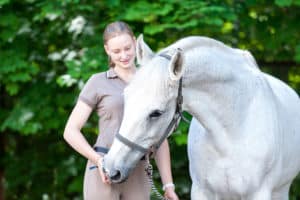
Study: Increased Rider Weight Doesn’t Significantly Impact Horses
While adding up to 25% more rider weight didn’t negatively affect the horses in this study, researchers cautioned that it could in the long run.
Coverage from the International Society for Equitation Science Conference held August 19-21 at the University of Guelph in Ontario, Canada.

While adding up to 25% more rider weight didn’t negatively affect the horses in this study, researchers cautioned that it could in the long run.

Smartphones and social media make sharing negative moments with horses—in context or not—easy. How the general public responds can have a lasting impact on the equine industry.

Biting is a sign of stress in foals. In this study, foals less than 8 weeks old that didn’t have training breaks bit their handlers more frequently than ones that got days off between training sessions.

Canadian researchers shared the results of their footing and force studies at an international conference. One looked at limb loading force, while the other investigated the impact of footing firmness and horse size.

Researchers found zero-finger tightness equaled 10 times the tightness of a human limb tourniquet.

British researchers investigated spur use in riders. Here’s what they found.

French researchers found horses with simulated C6-C7 nerve compression had shortened strides, tightened gaits, and a general lack of shoulder tone.

A zooarchaeologist presented a brief history of how horses and humans have coexisted and interacted over the the millennia at the International Society of Equitation Science convention.

Scientists and handlers use a large range of methods and opinions when interpreting equine behavior. A researcher from New Zealand calls for a standard.

“X days since last accident.” It’s a sign hanging at almost every high-risk industry site. Except, it seems, equestrian industry facilities. A researcher looks at why.

Temperament testing by a Brazilian research team found horses were more reactive with poorly matched riders, and a long-term riding relationship between horse and human didn’t guarantee a better outcome.

More than four hours without feed is fasting for a horse and can lead to issues. The solution for evening feeding? Slow feeders extended nighttime “grazing” time by 95-105%, researchers observed.

International Society for Equitation Science conference attendees learned about practical applications of scientific studies and discovered new theories about horse welfare and behavior.

Get an insider’s recap of the world’s leading equitation science conference. You’ll also learn about whip use, rider balance, and safety.
Stay on top of the most recent Horse Health news with
© 2022 Copyright Statement dolor sit amet, consetetur sadipscing User Terms, sed diam nonumy eirmod tempor invidunt ut labore et dolore magna aliquyam erat, sed diam voluptua. At vero eos et accusam et justo duo dolores et ea rebum. Stet clita kasd gubergren, no sea takimata sanctus est Lorem ipsum dolor sit amet.
"*" indicates required fields